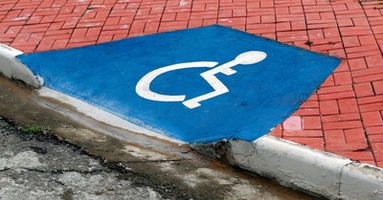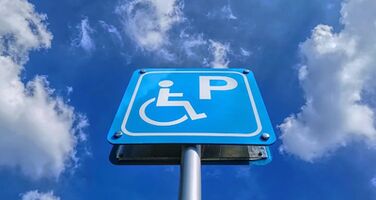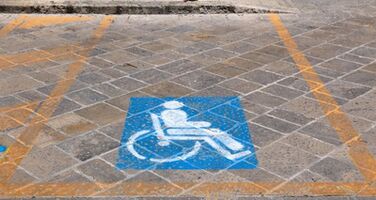
How to Get a Disabled Parking Permit for UC San Francisco UCSF: Comprehensive Guide for Faculty, Students, and Visitors
How to Get a Disabled Parking Permit for UC San Francisco UCSF - The University of California, San Francisco (UCSF) is dedicated to providing equitable access and accommodations to all individuals, including patients, faculty, students, and visitors. Tee school strives to ensure that everyone has access to parking facilities, medical services, and educational resources in a way that is inclusive of individuals with disabilities. One important element in achieving this is the ability to obtain a disability tag, which can facilitate easy access to disabled parking spots at UCSF's medical centers and campuses.
In this comprehensive guide, we will explore everything you need to know about getting a disability tag at UCSF, the process for acquiring one, and how it can benefit you. Whether you're a faculty member, student, or visitor to UCSF, we’ll cover how to apply for and use a disabled parking permit. Additionally, we’ll highlight the services offered by HandicapMD.com, which can help you easily obtain a disability tag online.
What is a Disability Tag?
A disability tag (also known as a disabled parking placard or permit) allows individuals with qualifying medical conditions to park in designated disabled parking spaces. These parking spaces are typically located near entrances to buildings, clinics, and other facilities, providing easier access for people who have difficulty walking long distances or need additional mobility accommodations.
To use disabled parking spots at UCSF, individuals must display a DMV-issued disability tag, which can be either a temporary or permanent placard based on the medical condition. Let’s delve into how the school supports disabled parking for its patients, visitors, faculty, and students.
UCSF Disabled Parking for Patients and Visitors
At the school, there are designated stalls for patients and visitors with DMV-issued disabled person placards located throughout the medical center’s parking garages. These accessible parking spots are marked by clear signage and are positioned conveniently close to medical facilities.
Displaying Your Disability Tag
To park in a disabled parking spot at UCSF, you must display your disability placard in your vehicle. This ensures that individuals with disabilities are granted convenient access to medical appointments, clinics, and other the school services.
Parking Fees and Discounts
While the school does charge parking fees, individuals with a disabled person placard may be eligible for discounted parking fees when exiting the parking garage. UCSF is committed to ensuring that patients and visitors with disabilities are not overly burdened by parking costs.
For information on UCSF valet parking services, UCSF shuttles, campus maps, and more, visit UCSF’s Locations Page or Disability Resources Guide.
Wheelchair Accessibility at UCSF
In addition to parking accommodations, the school provides wheelchairs for patients and visitors who need them. Wheelchairs are available at the entrances to most hospital and clinic buildings. If you need assistance obtaining a wheelchair or navigating UCSF’s facilities, guest services are available to assist you.
Service Animals at UCSF
UCSF welcomes service animals that are individually trained to perform tasks for people with disabilities. These animals are allowed in all public areas of the medical center. However, it is important to note that therapy, comfort, and emotional support animals are only permitted if they are registered participants in UCSF’s approved programs. For more information, you can review UCSF’s Service Animal Policy.
Interpreter Services and Assistance for the Hard of Hearing
the school offers comprehensive support for individuals with hearing impairments, including free in-person and video medical interpretation services in over 200 languages, including American Sign Language. This service is available 24/7 to all UCSF patients.
For the hard of hearing, the school provides TTY (telecommunication devices for the deaf) services 24 hours a day. Simply call (415) 885-3889 to connect with a medical center operator. Additionally, California Relay Service provides free telephone relay services for individuals without a TTY—just dial 711 on your phone.
Requesting Accommodations at UCSF
UCSF is committed to providing a wide range of accommodations for individuals with disabilities. If you need accommodations for your visit to the school, you can make a request through your healthcare team or by contacting staff at the specific location before or during your appointment.
Accommodations available at UCSF include, but are not limited to:
- Large print documents
- Door strobe lights for those with hearing impairments
- Alternative (hands-free) call lights for patients in hospital beds
For more information or to request accommodations, you can contact UCSF Patient Relations:
- Phone: (415) 353-1936
- Email: patient.relations@ucsf.edu
After-hours requests can be directed to UCSF’s hospital operator at (415) 476-1000.
How Faculty Can Get a Disability Tag at UCSF
UCSF faculty members who have qualifying medical conditions can apply for a DMV-issued disability tag to facilitate parking at the school campuses. This placard allows faculty members to park in designated disabled parking spaces and ensures easy access to workspaces, research centers, and teaching facilities.
Faculty members can obtain a disabled parking permit by:
- Applying through the handicapmd.com telemedicine service.
- Submitting the doctor’s certification of their qualifying medical condition.
- Displaying the placard in their vehicle when parking at the school facilities.
To learn more about faculty parking options, you can visit UCSF’s Parking Page.
How Students Can Get a Disability Tag at UCSF
Students at UCSF who have disabilities or medical conditions affecting their mobility can conveniently apply for a DMV-issued disability tag through HandicapMD. This service makes it easy for the school students to access the necessary certification from qualified healthcare providers online, simplifying the application process for a disabled parking placard. With this placard, students can park in designated disabled parking spots near lecture halls, labs, and other essential university facilities.
To obtain a disability tag, the school students can follow these steps:
Consult with a Healthcare Provider Online: Use HandicapMD’s telehealth service to receive certification for a medical condition that impacts mobility. HandicapMD's qualified providers understand ADA eligibility requirements and can help make the process more straightforward.
Submit the Application to the DMV: With the certification in hand, students can apply for a disabled parking placard through the California DMV.
Display the Disability Tag on Campus: Once approved, students can display their disability tag in their vehicle to access convenient parking on UCSF’s campuses.
For additional information about student parking, including details on disabled parking services, UCSF students can visit the UCSF Student Parking Page.
Qualifying Medical Conditions for a Disability Tag
The DMV issues disability tags to individuals with specific medical conditions that impair mobility, making it challenging to navigate campus environments efficiently. Students, faculty, and staff at the school with qualifying conditions can benefit significantly from a disability tag, as it provides convenient parking options, reducing travel time and physical strain. Below is a detailed list of common qualifying conditions, along with insights on how each condition affects campus mobility and why a disability tag is helpful.
1. Mobility Impairments
Examples: Difficulty walking, need for assistive devices like a wheelchair, cane, or crutches.
Helpful Links: National Institute on Disability, Independent Living, and Rehabilitation Research (NIDILRR) on Mobility Impairments
Impact on Campus Life: Individuals with mobility impairments often face difficulties traversing large distances or steep inclines. Navigating from parking lots to classrooms, labs, or lecture halls can be strenuous, especially in hilly areas of UCSF’s campuses.
Why a Disability Tag is Helpful: A disability tag provides access to parking spaces closer to key facilities, reducing the physical effort required for campus travel and minimizing fatigue from extended walking.
2. Chronic Lung Disease or Respiratory Conditions
Examples: Chronic Obstructive Pulmonary Disease (COPD), asthma, cystic fibrosis.
Helpful Links: American Lung Association on Lung Diseases
Impact on Campus Life: These conditions can make it difficult to walk long distances without experiencing shortness of breath, coughing, or fatigue. UCSF’s expansive campuses may be challenging for those with respiratory limitations.
Why a Disability Tag is Helpful: A disability tag allows closer parking to campus buildings, ensuring students and faculty can minimize unnecessary exertion and avoid triggering respiratory symptoms.
3. Cardiovascular Diseases
Examples: Heart failure, ischemic heart disease, arrhythmia.
Helpful Links: American Heart Association on Cardiovascular Diseases
Impact on Campus Life: Cardiovascular conditions often limit endurance, making it challenging for affected individuals to walk long distances or climb stairs. Symptoms like chest pain, dizziness, or fatigue can worsen with physical exertion.
Why a Disability Tag is Helpful: A disability tag reduces the distance required to reach campus destinations, making it safer and more feasible for students and faculty with cardiovascular conditions to move around campus comfortably.
4. Severe Arthritis
Examples: Rheumatoid arthritis, osteoarthritis.
Helpful Links: Arthritis Foundation on Types of Arthritis
Impact on Campus Life: Arthritis affects joint function and can cause significant pain, especially in the knees, hips, and hands. Walking or standing for extended periods can lead to joint stiffness, swelling, and discomfort.
Why a Disability Tag is Helpful: A disability tag allows individuals with arthritis to park near their destinations, reducing walking distance and alleviating strain on affected joints, which helps them conserve energy for their academic or professional responsibilities.
5. Loss or Limitation of Use of Limbs
Examples: Amputation, muscle atrophy, or paralysis affecting the arms or legs.
Helpful Links: Amputee Coalition on Limb Loss
Impact on Campus Life: Limited limb function can make maneuvering around campus slow and challenging, especially when carrying bags or equipment.
Why a Disability Tag is Helpful: A disability tag enables parking in close proximity to classrooms and laboratories, facilitating greater ease of access for individuals who face mobility challenges related to limb function.
6. Visual Impairments
Examples: Partial blindness, legal blindness, severe vision impairment.
Helpful Links: American Foundation for the Blind on Vision Impairments
Impact on Campus Life: Visual impairments can make navigation difficult, particularly in busy, unfamiliar, or poorly lit areas of campus. Crossing streets or navigating crowded areas may present additional risks.
Why a Disability Tag is Helpful: A disability tag provides access to designated parking areas that are safer and more conveniently located, allowing individuals with visual impairments to focus on navigating their immediate surroundings without the added challenge of distant travel.
7. Neurological Conditions Affecting Movement or Coordination
Examples: Parkinson’s disease, multiple sclerosis, cerebral palsy.
Helpful Links: National Institute of Neurological Disorders and Stroke (NINDS)
Impact on Campus Life: Neurological conditions often impact coordination, balance, and muscle strength, making it challenging to walk safely on uneven surfaces or for long distances.
Why a Disability Tag is Helpful: A disability tag ensures that individuals with neurological conditions can access parking near classrooms and other facilities, reducing the risk of falls or injuries and supporting their academic or work activities on campus.
It is essential to consult with your healthcare provider to confirm whether your medical condition qualifies for a disability tag. UCSF students, faculty, and staff can apply for a disabled parking placard through the DMV, either independently or by consulting HandicapMD.com for convenient online certification. For more information, please visit UCSF Student Parking Page or California DMV Disabled Parking Placards.
How HandicapMD.com Can Help UCSF Faculty, Students, and Visitors
HandicapMD.com is a trusted resource that can help UCSF faculty, students, and visitors easily obtain a disability tag. Our telehealth service specializes in reviewing medical records and certifying patients for DMV-issued disabled parking permits.
By using HandicapMD.com, you can:
- Apply Online: Skip the hassle of in-person DMV appointments. Our service allows you to apply for a disability tag online from the comfort of your home or office.
- Doctor Certification: HandicapMD.com’s licensed physicians are experts in evaluating your medical records and determining eligibility for a disability tag based on ADA guidelines.
- Convenient and Fast: We streamline the process, ensuring that you get your disability tag as quickly as possible without any unnecessary delays.
For UCSF patients, faculty, and students, HandicapMD.com provides a seamless solution to secure disabled parking permits. Our team is committed to making the process as convenient and accessible as possible.
Why Get a Disability Tag Online?
There are several benefits to obtaining your disability tag online through HandicapMD.com:
- Time-Saving: No need to wait in long lines at the DMV. You can complete the entire process online.
- Expert Guidance: Our team of physicians specializes in ADA compliance and knows how to certify you for a disability tag.
- Accessible to Everyone: Whether you're a busy faculty member, student, or visitor, applying online fits into your schedule.
- Comprehensive Services: HandicapMD.com handles the entire process, from medical certification to submission of your DMV application.
UCSF Accessibility Resources
UCSF is dedicated to improving accessibility for all individuals across its campuses. Whether you are visiting the school for medical appointments or are a part of the university community, accessibility is a top priority.
For more information, you can visit UCSF’s Office of Disability Access and Inclusion.
Making Access Easier with HandicapMD.com
UCSF is committed to fostering an inclusive environment where everyone—students, faculty, patients, and visitors—can access essential services and facilities with ease. To support this mission, patients, students, visits, and faculty of the school can get help with HandicapMD.com, making it simpler than ever to apply for a disability tag. By utilizing HandicapMD.com’s online platform, individuals can streamline the application process, obtain expert medical certification, and gain access to accessible parking spots across UCSF campuses.
HandicapMD.com’s online certification process is designed with convenience and accessibility in mind, allowing individuals to secure a disability tag without navigating traditional paperwork or waiting for in-person consultations. This streamlined approach aligns with UCSF’s commitment to equitable access, ensuring that no one is hindered by physical limitations when navigating the university’s facilities.
Why Use HandicapMD.com for Your Disability Tag Application?
Convenience of Online Certification
HandicapMD.com offers a fully online application experience, allowing users to obtain necessary medical certification from the comfort of their own home. This telehealth approach minimizes the need for in-person visits and accelerates the certification process, providing eligible applicants with a disability tag more quickly than traditional methods.Expert Medical Certification Tailored to Accessibility Needs
HandicapMD.com’s team of licensed healthcare providers specializes in ADA-compliant evaluations for mobility-related disabilities. Their expertise ensures that applicants receive thorough, accurate assessments that meet DMV standards, eliminating guesswork and enhancing confidence in the application process.Access to Parking Across All UCSF Campuses
With a disability tag, individuals can park closer to UCSF’s key facilities, including lecture halls, labs, and patient care areas. This benefit is invaluable for those who face physical challenges, as it reduces the strain of campus navigation and fosters a more accessible UCSF community.Support for a Wide Range of Conditions
HandicapMD.com is equipped to evaluate a broad spectrum of conditions that qualify for a disability tag, from cardiovascular and respiratory disorders to severe arthritis and neurological impairments. Their understanding of various mobility-limiting conditions ensures that the school students, faculty, and visitors with qualifying medical needs receive the support they need for accessible campus mobility.
Who Can Benefit from HandicapMD.com’s Services?
UCSF Students and Faculty: For students and faculty with mobility impairments, navigating the vast UCSF campuses can be challenging. A disability tag enables close parking to educational and research facilities, making daily routines more manageable and less physically taxing.
Patients and Visitors: For patients visiting UCSF’s healthcare facilities, easy access to parking is crucial for a stress-free healthcare experience. The ability to park close to UCSF’s medical centers can make attending appointments more convenient and accessible for patients with physical limitations.
Staff Members: the school staff members who face mobility challenges benefit from having accessible parking near administrative and operational hubs, enhancing their comfort and productivity while on the job.
Step-by-Step Process to Obtain a Disability Tag with HandicapMD.com
Visit the HandicapMD.com Application Page
Begin by visiting HandicapMD.com’s application page to learn more about the eligibility criteria, application requirements, and documentation needed for a disability tag.Online Consultation and Evaluation
Schedule an online consultation with HandicapMD.com’s licensed medical professionals. During this telehealth appointment, your healthcare provider will review your medical history, discuss your condition, and determine if you qualify for a disability tag based on DMV guidelines.Receive Your Medical Certification
Once evaluated, your healthcare provider will issue a medical certification indicating your eligibility. This document is essential for the DMV application process, as it verifies that you meet the criteria for a disabled parking placard.Submit the Application to the DMV
With your medical certification in hand, complete the DMV application for a disabled parking placard. HandicapMD.com provides guidance on how to submit your application, ensuring that all necessary steps are followed to expedite processing.Display Your Disability Tag
After receiving your disability tag, display it in your vehicle when parking on UCSF campuses. The tag allows access to accessible parking spaces, making it easier to reach your destination and navigate UCSF’s facilities.
Why a Disability Tag is Essential for Campus Accessibility
A disability tag offers more than just convenient parking; it’s a vital tool for equitable access across UCSF’s campuses. By reducing the physical demands of campus travel, a disability tag empowers individuals to focus on their academic, professional, or personal goals without the added strain of limited mobility.
For students managing coursework or faculty members conducting research, accessible parking supports a smoother campus experience. Patients and visitors attending medical appointments at UCSF benefit from the proximity of disabled parking spots to healthcare facilities, reducing the challenges associated with healthcare access. Finally, the school staff can navigate their work environment more effectively, contributing to a productive and supportive community.
Make Accessibility a Priority with HandicapMD.com
UCSF and HandicapMD.com are dedicated to ensuring that everyone has equal access to UCSF’s facilities and services. By offering a seamless online application process, HandicapMD.com helps individuals with mobility limitations overcome barriers and access the resources they need. If you or someone you know could benefit from a disability tag, visit HandicapMD.com’s application page to begin the process.
With the right resources, UCSF and HandicapMD.com are making campus accessibility a reality for everyone.
Additional UCSF Links:
This Get a Disabled Parking Permit for UC San Francisco UCSF guide is designed to make obtaining a disability tag for UCSF simple and accessible, offering insight into the resources available at the school and the benefits of applying online through HandicapMD.com.
.png)






